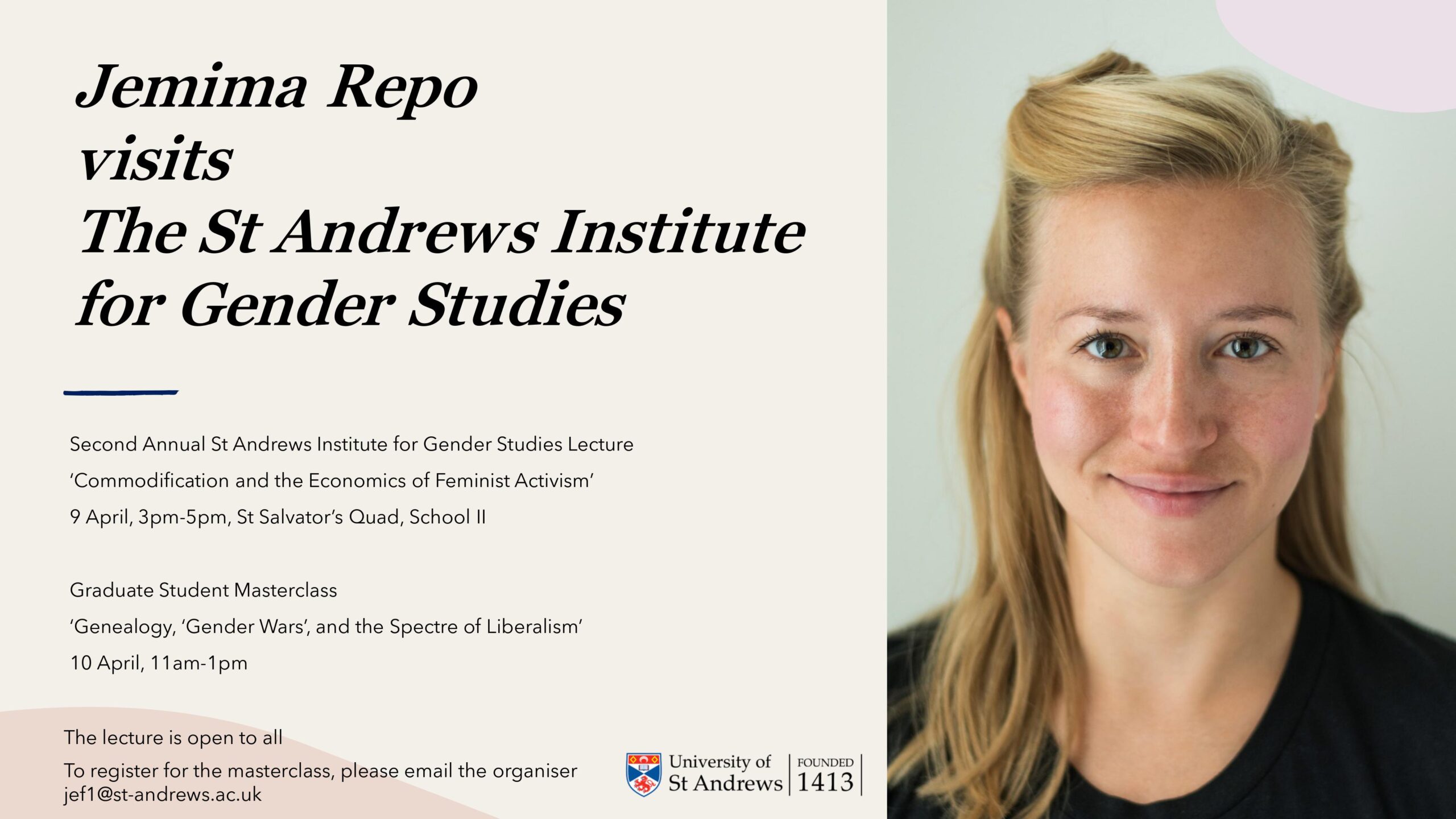

- This event has passed.
Second Annual St Andrews Institute for Gender Studies Lecture 9th April
Tue 9 Apr @ 3:00 pm - 5:00 pm

The St Andrews Institute for Gender Studies is delighted to announce that Dr Jemima Repo will be visiting this April.
Dr Repo is Reader in Political and Feminist Theory at Newcastle University. She has published widely on topics across contemporary social and political theory (especially feminist theory and biopolitics), the politics of population, political economy, Palestine, and popular culture. Dr Repo’s book, The Biopolitics of Gender, was published by Oxford University Press in 2015 and was awarded the 2017 International Studies Association’s Feminist Theory and Gender Studies Book Award. She was also the 2021 winner of the APSA Okin-Young Award in Feminist Political Theory.
Dr Repo will be delivering both our annual StAIGS Lecture and our Graduate Student Masterclass. The lecture is open to all, but the masterclass is registration only and places are limited, so please contact the organiser, Dr Fletcher (jef1), if you would like to attend. Full details for these events are below and the poster is attached.
Second Annual St Andrews Institute for Gender Studies Lecture
April 9, 3pm-5pm, St Salvator’s Quad, School II
The Lecture will be followed by a wine reception in Edgecliffe.
Title: Commodification and the Economics of Feminist Activism
Abstract: The resurgence of feminist activism in recent years has been accompanied by the emergence of feminist commodities, some by small feminist businesses, others mass-marketed by chains, some sold purely for profit, others attached to donations to feminist and other social justice causes. This entails two shifts in feminist activism: first, the increasing reliance on charitable giving through commodity consumption as a means of feminist political action and second, the transfer of the work of feminist activism from movements to enterprises. This paper examines the implications of such feminist practices by juxtaposing them with past instances of feminist activism engaged with the commodities. Selling things has been a part of funding feminist activism since the women’s suffrage movement. During the second wave, feminists likewise had to make various compromises or take political risks in order to secure funding for activism. I examine the parallels between contemporary and past economic modes of feminist activism, and in so doing analyse how the intensified turn to commodification and the enterprise form change the politics of feminism itself.
St Andrews Institute for Gender Studies Graduate Student Masterclass
April 10, 11am-1pm, Muir Room, Old Burgh School
The Masterclass is registration only, so please register by March 22 to avoid disappointment. The Masterclass will be followed by a catered lunch.
Title: Genealogy, ‘Gender Wars’ and the Spectre of Liberalism
Abstract: Polarisation is widely recognised as a mainstay of the current feminist debate around gender in the UK, and beyond. ‘Gender critical feminists’ or ‘TERFs’ are pitted against ‘trans activists’ or ‘trans-inclusionary’ feminists. There are many effects of this polarisation. For starters, these two groups are assumed to be internally coherent politically, theoretically and ideologically. In this paper, I am interested in three further effects, which I also wish to counter. First, the polarisation of feminism has led to a sense that the two positions exhaust the possible feminist approaches to gender today. Second, the polarisation of feminism has led to newfound efforts across feminisms to stabilise and entrench given definitions of ‘gender’ as true that run contrary to the queer/poststructural feminist ethos, and third, it has re-established the liberal politics of recognition as the primary legitimate mode of feminist politics. The paper draws on feminist, queer and trans genealogies to destabilise these configurations and to consider a politics that displaces the matrices of identity, representation, and recognition.

